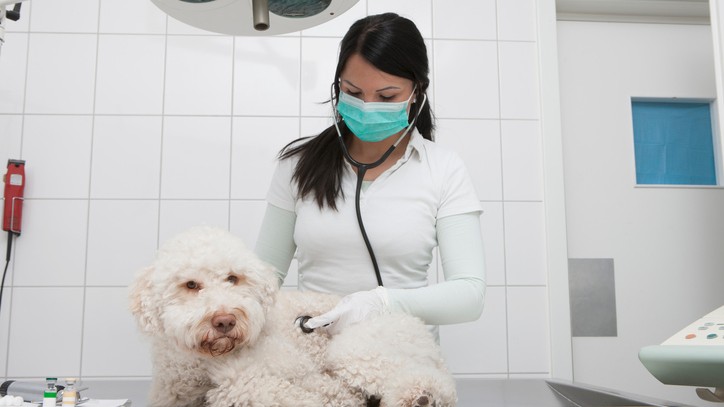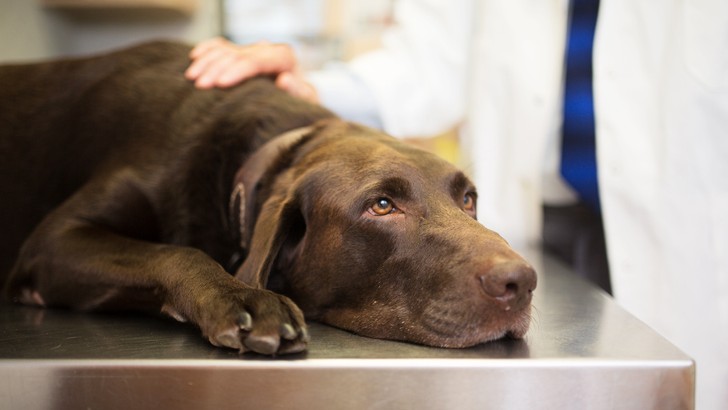Pancreatitis in dogs: A vet’s guide
Pancreatitis in dogs is a painful condition that requires prompt treatment. Here’s all you need to know!

Get the best advice, tips and top tech for your beloved Pets
You are now subscribed
Your newsletter sign-up was successful
Pancreatitis in dogs is a painful condition, which can come on suddenly (‘acute’ pancreatitis) or become a long-term problem (‘chronic’ pancreatitis). It usually affects middle aged and older dogs, but can happen at any age. Any breed of dog can get pancreatitis, but Cocker Spaniels, Terriers, Dachshunds, Miniature Schnauzers, and Poodles are more prone.
Symptoms of pancreatitis can vary, meaning the illness can be anywhere on the spectrum from mild to very severe. Sometimes treatment can be given at home, but unfortunately dogs with pancreatitis usually need to be hospitalised. Usually, the quicker pancreatitis is diagnosed and treated, the better the outcome. It’s important to be aware of the symptoms so you can have your dog checked by a vet as soon as possible.
- A vet's guide to Osteoarthritis in cats
- A vet’s guide to Parvovirus in puppies
- Can dogs eat bones? A vet answers...
What is pancreatitis in dogs?
The pancreas is a little organ which sits in the right side of the abdomen (tummy area), next to the stomach. It produces digestive enzymes, which are released into the small intestine and are involved in breaking down food. It also produces hormones such as insulin, which keep the blood sugar stable.
The word ‘pancreatitis’ means ‘inflammation of the pancreas’. So, pancreatitis is an illness where the pancreas becomes inflamed, swollen, and sore. It happens when the digestive enzymes that the pancreas produces become active too soon, before they reach the small intestine, so they start trying to digest the pancreas itself.
How do dogs get pancreatitis?

There’s no NHS for pets. Veterinary care can be eye-wateringly expensive and most pets will need treatment for an illness or injury at some point in their life. It’s difficult to think about your animals being hurt or unwell, but you need to ask yourself: what would you do if you were faced with a vet bill for hundreds or thousands of pounds?
The exact cause of pancreatitis in dogs is often unknown. This is called ‘idiopathic’ pancreatitis. One known and common trigger is eating food that is high in fat. This could be due to well-meaning owners inappropriately treating their pets, or due to dogs scavenging.
Sometimes certain drugs and toxins can cause pancreatitis too, such as some of the drugs used to treat epilepsy. Major surgery or trauma to the abdomen, like in a road traffic accident, can also be risk factors. Lastly, pancreatitis in dogs has been caused by certain infections, such as Leishmania (a parasitic disease) and Babesia canis (a blood parasite).
Symptoms of pancreatitis in dogs
The symptoms of pancreatitis can be vague. The most common symptoms are:
Get the best advice, tips and top tech for your beloved Pets
- Reduced appetite
- Lethargy (a lack of energy)
- Diarrhoea
- Feeling or being sick
- Fever (a high temperature)
- Abdominal (tummy) pain
- Collapse (rarer)
Abdominal pain can be hard to spot in dogs, since they can’t tell you where it hurts! Dogs with tummy ache will often be restless, have trouble getting comfortable and will often adopt the ‘praying’ position — their elbows on the floor, head to the ground, and their bottom sticking up in the air.
All of these symptoms can have other causes and, thankfully, often are nothing to worry about. However, it is important to see your vet if your dog is:
- In pain
- Not eating
- Very lethargic, or sleepy
- Hot to touch
- Passing diarrhoea or being sick continuously; or occasionally for more than 24 hours
If you have any concerns, or you aren’t sure, then it’s always safest to call your vet for advice. If your vet suspects pancreatitis then they will perform blood tests and X-rays or ultrasound to confirm their diagnosis, and to assess how poorly your pet is.

- Is my dog sick? Ten signs you need to take your dog to the vet
- How to identify a pet emergency: A vet’s advice on when to call the vet
- How much does an emergency vet cost? And how can you pay for one?
Treating pancreatitis in dogs
Although some very mild cases can be treated at home, most dogs with pancreatitis will need to be hospitalised. Unfortunately, there is no cure for pancreatitis, so treatment is supportive. This means treating the symptoms, while allowing the pancreas to rest and recover.
Pain relief is a really important part of the treatment. Pain can be monitored and treated better in hospital. Treatment usually also involves a fluid drip for hydration and to maintain electrolyte balance. Medicines are given to prevent sickness, combat nausea and protect the stomach lining.
Dogs with pancreatitis usually won’t eat but, if the patient is eating, they would be fed small and frequent low-fat meals. This is to reduce the work the pancreas needs to do. Some dogs will stop eating completely, in which case they may need a feeding tube while they recover. Dogs that are very severely ill, such as those that collapse, will need to be treated in intensive care.
The good news is that dogs usually make a full recovery from pancreatitis. However, they may then be prone to bouts of the illness for life. In severe cases pancreatitis can also cause long-term health problems. If the pancreas is badly damaged it may not be able to produce enough of the hormones that control blood sugar, leading to diabetes. Similarly, if it cannot produce enough digestive enzymes, this causes a condition called exocrine pancreatic insufficiency (EPI). In these cases, treatment would be needed for life. Sadly, pancreatitis can be fatal if not treated early enough, or in very severe cases.
Tips on preventing pancreatitis in dogs
Unfortunately, pancreatitis cannot always be prevented. However, there are things you can do at home to reduce the risk. This is especially important if your dog has had pancreatitis in the past. Here are our top tips for preventing pancreatitis in dogs:
- Overweight dogs are more prone to pancreatitis, so keep your dog fit and slim.
- Avoid feeding your dog fatty treats or human food. We all know it can be hard to resist those puppy dog eyes, but it really is in their best interests! Try some cooked chicken breast, special low-fat dog treats or some of their usual kibble as treats instead.
- Feed a low-fat food. If your dog has had pancreatitis, your vet will probably advise a prescription low fat diet. Off the shelf ‘low fat’ diets may still contain too much fat. Your dog’s diet must be appropriate for their life stage, so you should always consult your vet before starting a prescription food.
If your pet has suffered with pancreatitis in the past, your vet will discuss an ongoing plan with you, to reduce the chances of a repeat episode.
Final thoughts
Pancreatitis in dogs is a painful and potentially very serious disease. Prompt treatment is so important and usually leads to a better recovery. So, if you have any suspicion that your dog may be suffering with pancreatitis, or they have any of the symptoms listed here, call your vet straight away.
Sarah-Jane Molier graduated in 2009 and has been enjoying life as a vet ever since. She currently works as Head Veterinarian in a small animal practice. Sarah-Jane particular enjoys internal medicine, alongside her managerial role. When not working in practice Sarah-Jane enjoys sharing her knowledge and helping pet parents by writing on a wide variety of animal health and medicine topics. In her spare time Sarah-Jane loves walking Nero (her rescue dog), gardening with her two young children and reading.

